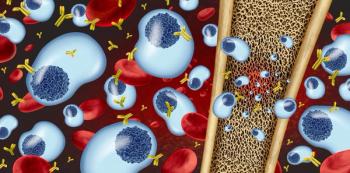
The action is supported by positive safety and efficacy findings from the phase 1a/1b first-in-human Beamion LUNG-1 trial.

The action is supported by positive safety and efficacy findings from the phase 1a/1b first-in-human Beamion LUNG-1 trial.

Intranasal insulin shows promise in targeting memory regions of the brain, offering new hope for Alzheimer disease treatment in older adults.

Older adults in the United States continue to be burdened with disproportionate rates of community-acquired pneumonia hospitalizations, including due to serotypes covered in the recently approved V116 vaccine.

Jennifer Goldman, PharmD, CDCES, BC-ADM, FCCP, explains the different stages of type 1 diabetes, teplizumab’s use, and emphasizes the pharmacist’s role in care.

Discover effective strategies for managing obesity to enhance cardiovascular health, including innovative treatments and the vital role of pharmacists.

Pharmacists should consider GLP-1 receptor agonists as second-line agents in older adults with DKD when additional glycemic control is needed.

RSV poses a serious risk to older adults in long-term care, highlighting the need for effective outbreak management and infection control strategies.

Discover effective strategies for managing opioid-induced constipation, including the role of PAMORAs and pharmacist involvement in pain management.

Pharmacists play a crucial role in managing headaches in patients on complement inhibitors for PNH, ensuring proper education and risk mitigation strategies.

Birelentinib gains FDA fast track designation, offering hope for relapsed CLL/SLL patients resistant to current BTK and BCL2 therapies.

Promoting heart health in children reduces obesity and chronic disease risks, ensuring better overall well-being into adulthood.

Recent data link a higher consumption of ultraprocessed food to increased lung cancer risk, highlighting the need for dietary changes and further research.

Discover the latest advancements in multiple myeloma treatment, including new therapies and FDA approvals that enhance patient outcomes and survival rates.

PHESGO reduced patient infusion time from 90 minutes to as few as 5, enhancing patient experience while maintaining efficacy and safety.

Donanemab-azbt shows sustained benefits in slowing cognitive decline in Alzheimer disease, emphasizing the value of early intervention and treatment.

New research highlights a surge in pediatric pneumococcal pneumonia cases post COVID-19, urging a shift toward supportive treatment strategies.

Discontinuing lenalidomide after 3 years of MRD negativity shows low relapse rates in multiple myeloma, offering hope for treatment-free remission.

Eileen Peng, PharmD, discusses how her team has restructured pharmacy services to support outpatient administration of CAR T-cell and bispecific therapies—emphasizing multidisciplinary collaboration, early toxicity management, real-world data integration, and pharmacist-led care transitions to ensure safety and continuity across care settings.

Two pharmacy leaders at UNC Health share how their distinct yet complementary leadership journeys and skill sets are driving innovation in clinical practice, education, and team development across the health system.

Maximizing pharmacists’ impact on medication safety requires removing barriers to intervention and empowering proactive clinical roles.

FDA approves inclisiran as a monotherapy to effectively lower low-density lipoprotein cholesterol in adults with hypercholesterolemia, enhancing heart disease prevention strategies.


The authors note that the findings can have significant public health implications given the widespread water chlorination and increased chronic kidney disease burden.

Patients should be supported by a multidisciplinary team, frequent evaluations, and behavioral therapy for optimal care.

Sanofi's SAR446523 receives orphan drug designation for relapsed/refractory multiple myeloma, enhancing treatment options and patient outcomes.

RSV hospitalization in older adults links to increased cardiovascular events, highlighting the need for vigilant monitoring and vaccination strategies.

Pirtobrutinib shows promising results in a head-to-head trial against ibrutinib for chronic lymphocytic leukemia (CLL)/small lymphocytic leukemia (SLL).

Decentralized pharmacists play a critical role in reducing medication errors by collaborating in real time with physicians and nurses to enhance patient safety across care settings.


Luspatercept shows promise in reducing transfusion dependence for myelofibrosis-associated anemia, despite not meeting primary trial end points.